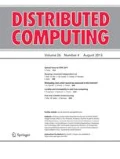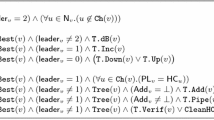Summary
It is shown that Dijkstra'sk-state self-stabilizing protocol for mutual exclusion in a unidirectional ring can be converted to a 3-state protocol by replacing a counter with a random number generator.
Similar content being viewed by others
References
Dijkstra EW: Self-stabilizing systems in spite of distributed control. Commun ACM 17:643–644 (1974)
Dijkstra EW: EWD 391 self-stabilization in spite of distributed control. In: Dijkstra EW (ed) Selected writings on computing: a personal perspective. Springer, Berlin Heidelberg New York 1982
Herman T: Probabilistic self-stabilization. Inf. Process. Lett. 35:63–67 (1990)
Israeli A, Jalfon M: Token-management schemes and random walks yield self-stabilizing mutual exclusion. In: Proceedings of the Ninth Annual ACM Symposium on Principles of Distributed Computing pp 119–131, 1990
Author information
Authors and Affiliations
Additional information
Ted Herman worked for many years in the software industry. He is principal architect of the Emc2 system for electronic mail and coarchitect of the Emc2/TAO system for office automation. He received the Ph.D. degree in computer science under the tutelage of Mohamed Gouda at the University of Texas at Austin. During 1991–1992, he was visiting faculty at the University of Iowa; during 1992–1993 he is visiting faculty at the University of Utrecht.
Rights and permissions
About this article
Cite this article
Herman, T. Self-stabilization: randomness to reduce space. Distrib Comput 6, 95–98 (1992). https://doi.org/10.1007/BF02252680
Received:
Accepted:
Issue Date:
DOI: https://doi.org/10.1007/BF02252680




